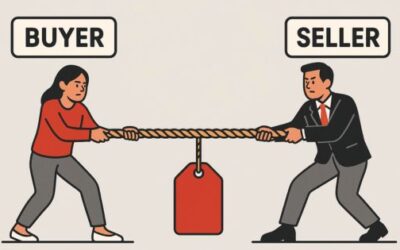The Best Sales Training or Just Sales Training?
Sales training has been around for about 75-100 years. In spite of its longevity, the jury is still out, as many organizations wonder does sales training actually work?
Like in most cases, I don’t think we’re asking the right question. The question isn’t whether or not sales training works, but rather does the sales training contain the proper ingredients to be effective? Sales training, like all other “trainings,” requires more than tactics and ideas and methods. It needs to be rooted in substance and a core ideology. It needs to address the student, the teacher and be fundamentally connected to the topic it’s teaching. So the question isn’t does sales training work. The question is, “What elements are required for sales training to work?”
When it comes to sales training, there are 5 key elements that the best sales training should have and should be part of any sales organizations’ decision criteria. If these elements don’t exist, the success of the training is severely compromised. In other words, it ain’t gonna work.
Key #1: The Psychology of the Sales Profession
First and foremost, when assessing the best sales training, we need to be asking if it is rooted in psychology. When I say psychology, I don’t mean the psychology of the sale but rather the psychology of decision making. At the end of the day, sales is the ability of a salesperson to influence a buyer to make a decision to change. It is not about the product or feature or solution, but rather it is about understanding how people process information and how they make decisions. Any sales training or methodology that isn’t fundamentally rooted in how people decide cannot effectively help people sell. Too often, sales trainings and techniques are product-centric. They are rooted in helping sellers pitch or tell or “convince.” They use methods designed to manipulate the buyer or control the buyer or their behaviors. Tactics like mirroring or getting the customer to say yes or other slightly deceptive approaches designed to trigger buyer behavior in the reps favor isn’t selling.
Sales training rooted in the psychology of decision making brings a very different approach to the sale. People make decisions based on an infinite number of criteria; however, these criteria can be broken down into two key elements, their current state and their future state. When we look to make a decision, the first thing we ask ourselves is, “Is my current state untenable for intolerable? Am I ok where I am at the moment?” If the answer is no, we don’t change, period. If it is yes, it is intolerable; we commit to change. Once we commit to changing, we then ask ourselves, “what are my new options, and what’s it going to cost to change?” It’s this framework that ALL decisions are made and any sales training that is not rooted in this psychology won’t drive the sale — period!
Key #2: Sales is Change Management
A sale requires change. This is an absolute. Sales cannot happen without change. It could be argued that salespeople are change influencers. Accepting this absolute truth as the core to selling is critical to understanding how to sell. The best sales trainings in the world must accept this absolute and have it baked into their methodology. The training needs to address people’s resistant to change, how they process change, what it takes to get people to consider change, and finally how to get them to decide to change. Too many sales trainings focus on activity and tactics, steering salespeople to things like an upfront contract or getting to the decision maker or closing techniques. Although, these can be helpful and, at times, are part of the selling process, they are useless without understanding the internal change management process going through people’s heads when they are deciding to make a purchase.
The best sales training embraces the change aspect of decision making and provides salespeople with an approach to influence change for the benefit of the buyer. Great sales training is about helping the buyer change, not selling them a product.
Key #3: Sales Training Should Be Entertaining (Fun!)
This one might surprise you or maybe even got you to cock your head to the side and go “uh?”
I get it. Sales training and entertainment are not traditionally spoken or written in the same sentence, and that’s a problem.
If you stop and think about it for a second, the best sales trainings must be entertaining — why? How am I defining entertainment? I’m defining it as being fun and engaging. Because if training is not fun and entertaining, it seriously hampers retention, engagement, and absorption. When a sales training is built to be entertaining and fun, by default, it is engaging. When a sales training is engaging, more people participate more often. With more participation comes greater absorption; with greater absorption comes improved and accelerated application; with greater application comes the desired results of improved win rates, shorter sales-cycles, and high average sales prices. And isn’t that why we pay for sales training in the first place.
Any sales training that is not designed to be entertaining, or does not leverage entertaining instructors, puts participant engagement at risk. When participants lose interest, we all know what comes next.
The best sales training is the most entertaining sales training and delivers the highest return on investment.
Want Sales Tips Straight to Your Inbox Every Sunday? Join Our Newsletter!
Key #4: Sales Coaching Framework
It happens all too often. The instructor loves to hear themselves talk. They’re excited about what they are sharing and teaching. They give you exercises. They share their knowledge. They tell their stories. They pair you in groups for a mini project etc . . . But they never really provide any feedback or coaching along the way. They’ll occasionally say; “Nice work Jalen..” but they don’t challenge participants or push them until they see them able to apply what they are teaching.
Sales training isn’t about pontificating about a cool methodology or a bunch of tactics, but rather, it is about changing the behaviors and selling approaches of salespeople. Therefore, to maximize outcomes, the best sale training has built in coaching opportunities. It is designed to create opportunities to observe the participants apply what they are learning in order to provide, solid, constructive, supportive feedback. The best sales training incorporates a coaching framework that includes the following:
- Observation
- Description
- Prescription
- Absorb
- Apply
Sales training without built in coaching opportunities like the above is not sales training. It’s a lecture. Lectures don’t work. Lectures check boxes not change behaviors. The goal of the best sales training should be to change behaviors, and embedding coaching into the training is the only way to do that.
Key #5: Sales Role Play
Yeah, I know. Sales people hate role play. They find it intimidating, scary, and hard. I get it. It is, but there is nothing better for the coaching aspect of training than providing customized, targeted role play opportunities for participants to practice what they are learning. Like coaching, it’s not enough to simply lecture and run people through a few exercises. It’s important to give them opportunities to try. Like learning anything, skiing, tennis, golf, etc. once the instructor tells you what to do, they ask you do it. They want you to try what they’ve taught you and see how it feels,. It’s from these attempts at execution the instructor can observe how well you absorbed their instruction and where they can offer addition prescription to help you get better.
Role play helps participants improve during the training, not when they get home and the instructor is not watching and not able to offer feedback. The best sales training in the world provides role play that helps participants practice and helps the instructor coach and provide feedback in real time, creating immediate improvement and growth for the participants, not later when there is no opportunity to provide feedback.
If you’re evaluating what the best sales training is for your organization, these 5 criteria are critical. Evaluate each sales training through these criteria and ask:
- Does the sales training leverage the psychology of decision making?
- Does the sales training embrace the concept of how people change?
- Is the sales training entertaining and fun?
- Is coaching built INTO the training curriculum?
- Does the sales training leverage role play?
If these 5 elements exist in spades, you’ve found one of the best sales trainings available. If not, then keep looking.
Remember, you’re not buying sales training. You’re buying more revenue, shorter sales cycles, improved win rates, and higher average sales prices. And training that doesn’t have these 5 won’t allow you to achieve the outcomes you’re looking for.
And who wants to pay something and not get the results – not me!?



0 Comments